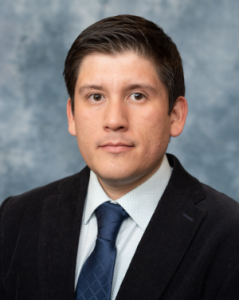Lecture 1.6
Title: Tutorial — Single-Particle Tracking in Python
Lecturer: Dr. Luis Aguilera
Lecturer Website: https://www.engr.colostate.edu/~munsky/
Lecturer Email: luis.aguilera@colostate.edu
Learning Objectives:
-
-
- To simulate 2D random walks.
- To implement a code to track single particles.
- To calculate mean square displacement and diffusion coefficients.
- To use the scientific libraries needed to segment and track single molecules in live cells.
- To load the experimental data.
- To perform a cell segmentation using Cellpose https://github.com/MouseLand/cellpose.
- To perform particle tracking using Trackpy http://soft-matter.github.io/trackpy/v0.5.0/.
-

Dr. Luis Aguilera obtained his Ph.D. in Biomedical Engineering and Physics from the National Polytechnic Institute in Mexico. Luis Aguilera works as a postdoc at Colorado State University with Dr. Brian Munsky applying computational algorithms to integrate single-molecule gene expression data with stochastic models. He is also interested in developing open-source software in Python to interpret complex biological systems, such as viral infections and innate immune response.
Title: Single-Particle Tracking in Python
Abstract: The first part of this tutorial provides a implementation of a i) 2D random walk simulator and ii) a particle tracking pipeline. The second part of the tutorial provides a pipeline to track single-molecule RNA in a cell. At the end of the tutorial, the student is expected to acquire the computational skills to independently implement the following list of objectives.
Suggested Reading or Key Publications:
- Colab Notebook Part 1
- Colab Notebook Part 2
- da Rocha-Azevedo, B., Lee, S., Dasgupta, A., Vega, A.R., de Oliveira, L.R., Kim, T., Kittisopikul, M., Malik, Z.A. and Jaqaman, K., 2020. Heterogeneity in VEGF Receptor-2 Mobility and Organization on the Endothelial Cell Surface Leads to Diverse Models of Activation by VEGF. Cell reports, 32(13), p.108187.
- MacKintosh, F.C., 2012. Active diffusion: the erratic dance of chromosomal loci. Proceedings of the National Academy of Sciences, 109(19), pp.7138-7139.
- Lyon, K., Aguilera, L.U., Morisaki, T., Munsky, B. and Stasevich, T.J., 2019. Live-cell single RNA imaging reveals bursts of translational frameshifting. Molecular cell, 75(1), pp.172-183. https://www.sciencedirect.com/science/article/pii/S1097276519303557
Links to Relevant Software:
- da Rocha-Azevedo, B., Lee, S., Dasgupta, A., Vega, A.R., de Oliveira, L.R., Kim, T., Kittisopikul, M., Malik, Z.A. and Jaqaman, K., 2020. Heterogeneity in VEGF Receptor-2 Mobility and Organization on the Endothelial Cell Surface Leads to Diverse Models of Activation by VEGF. Cell reports, 32(13), p.108187.
- Cellpose https://github.com/MouseLand/cellpose
- Trackpy http://soft-matter.github.io/trackpy/v0.5.0/
- Question 1. Implement a 2D random walk simulator.
- Question 2. implement a tracking pipeline using Trackpy.
- Question 3. Increase the diffusion coefficient in your 2D random walk simulator and determine the efficiency of your tracking pipeline.